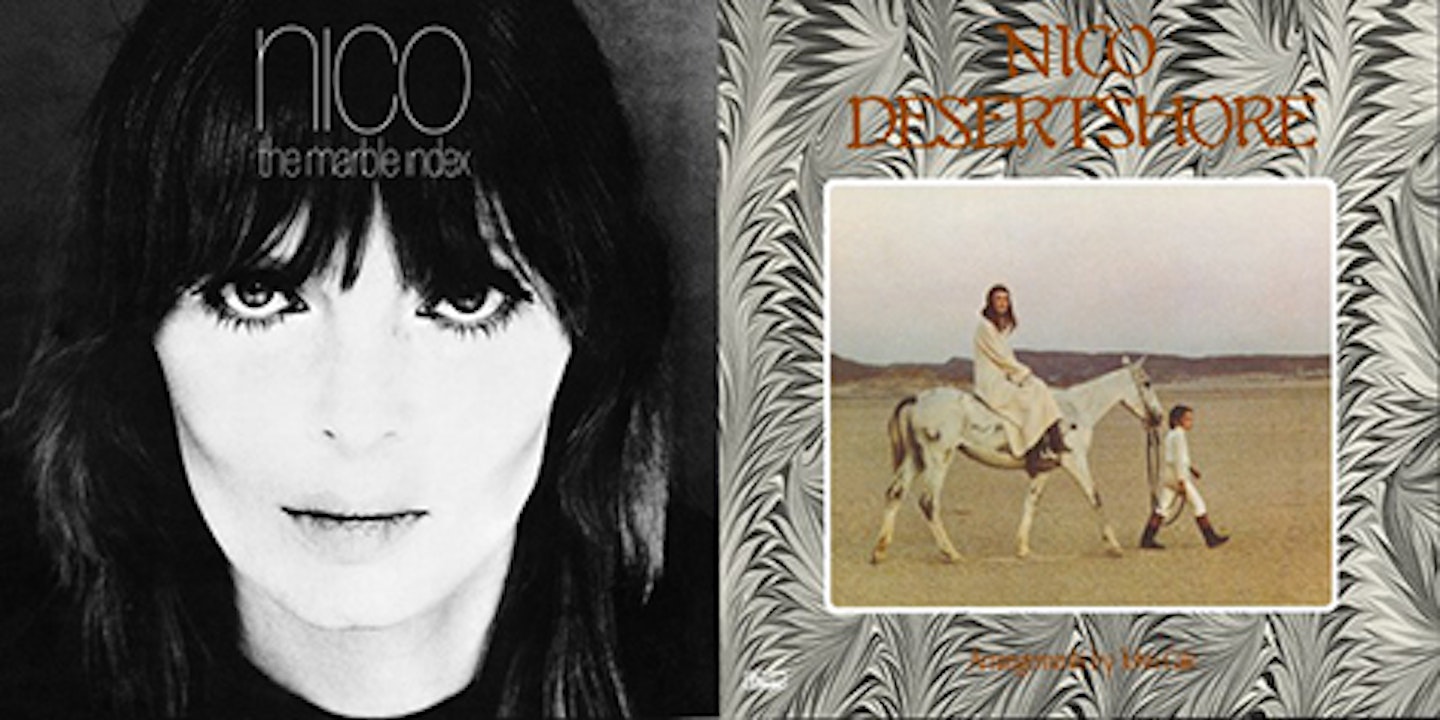Nico
The Marble Index/Desertshore
★★★★★
DOMINO

IN PETER DOGGETT’s exemplary linernotes to these reissues, he quotes an interview Nico gave shortly before her death in 1988, aged 49, where she explains her desire to make “archaic music… music you imagine from thousands of years ago. Cave music.”
Many critics have referenced early church music in writing about The Marble Index and Desertshore, the two albums the former Velvet Underground singer recorded between 1968 and 1970, but this quote seems to suggest that the solo music composed by the woman born Christa Päffgen was reaching even further back to something ancient and primeval.
The roots of Nico’s mysterious, visionary sound can be found in It Was A Pleasure Then, the closer on side one of her tentative 1967 debut, Chelsea Girl. While much of Chelsea Girl found Nico covering pretty compositions by Jackson Browne, Tim Hardin and Bob Dylan, this collaboration with former Velvet compatriots John Cale and Lou Reed was an eight-minute modal drone, Nico utilising her lowest vocal range to summon sinuous dreamlike images from deep inside herself, in search of something vast and eternal.
Composed in the bathtub of Factory alumnus Fred Hughes’ East 16th Street New York apartment and on a portable harmonium purchased in San Francisco in 1967 (“I no longer have to rely on guitarists”), the songs for Nico’s second LP, The Marble Index, continue this mythic quest.
Speaking to me in 2022, John Cale, arranger and de-facto producer on The Marble Index, said of Nico’s compositions: “They create their own time. It’s a strange world, a world of mystery, but it’s real.” It’s also a world that requires some adjusting to.
Fittingly, The Marble Index opens with the pointedly pretty Prelude, an easeful acculturation to Nico and Cale’s soundworld comprised of low-end piano, bells, celeste and guitar. This gives way to Lawns Of Dawns. Influenced by the lyrics of Jim Morrison, whom Nico had hung out with in the summer of 1967, Lawns Of Dawns is both a modal variation on the pagan round dance and a eulogy to LSD (“I cannot understand the way I feel/Until I rest on lawns of dawns”). It ushers you, White Rabbit-like, into Nico’s timeless new landscapes, like the complex waltz-like No One Is There, where Cale’s pastoral string section lightly dances around Nico’s low chimerical chants, and Ari’s Song, a forlorn Blakean lullaby to her six-year-old son (who she’d sent to live with his father, the actor Alain Delon) that is also a love song to unconscious oblivion (“Only dreams can send you where you want to be”).
Nico said of heroin (introduced to her by Chet Baker in 1964) “it is a seduction… like loving someone you hate”, and The Marble Index works in similar fashion, enticing you in to a world both forbidding and enchanting. That mix of sensations is partly down to the limitations of Nico’s harmonium. “It was not in tune with itself, or anything else,” said Cale. As a result, he used bells, glockenspiel, mandolin and viola drones to “leaven out” the harmonium’s unrelieved low chords and Nico’s deep, weary contralto.
On the gorgeous, cinematic Frozen Warnings his harmonics add a rippling, horizonless vastness to Nico’s gelid imagery, while on circular conjuration Evening Of Light, an album closer seemingly located on the edge of time itself, Cale colours the desolate landscapes with chiming layers of mandolin and groaning glaciers of overdubbed viola, placing the song somewhere between shimmering Arctic sunlight and perpetual midnight.
Barely half an hour in length, The Marble Index was mostly met with confusion on release. When Nico complained about Elektra’s inability to market it, Cale simply replied, “Nico, how do you sell suicide?”
It sold hardly anything and in response Nico skipped the country and went travelling in Egypt, Rome and then Paris, where she met 20-year-old film-maker Philippe Garrel. The pair inspired each other. Garrel began work on a film, The Inner Scar, as homage to his new love, whilst Nico created a fresh set of songs, “a visual… visionary music” intended as a possible soundtrack.
Recorded with Cale and Joe Boyd for Reprise, Desertshore was an LP inspired by friends, family and lovers and, as such, possesses a more seductive, elegiac feel than The Marble Index. It’s a downward spiral but one that invites you to fall into its chilly embrace and surrender.
But first, you must get beyond Janitor Of Lunacy. Part written for former lover Brian Jones, but also a possible paean to heroin, Janitor is an undulating gothic sea shanty, a declamatory prayer to a tyrannical entity that can “Revive the living dream/Forgive the begging scream”. The song is also the album’s own custodian. Listeners who never get beyond its frosty stentorian warning are denied the pleasures within, pleasures which begin with her song for Andy Warhol, The Falconer. Written following the attempted murder of the pop artist by Valerie Solanas, it’s an admittedly sparse and forlorn number, made more unsettling by some sepulchral chain-clanging from Cale, but Nico’s singing and her use of melody invest it with a curious warmth and compassion. Little on The Marble Index could be called pretty, but Desertshore is interspersed with moments of forlorn beauty. The first two are My Only Child, a song for Ari, in which the singer’s vulnerable vocal is accompanied by interlacing choral harmonies, and the second is the heartbreaking yet terrifying Le Petit Chevalier, in which six-year-old Ari, accompanied by John Cale’s plaintive harpsichord, sings, in halting French, “I am the little knight/With the sky above my eyes/I can’t scare myself ”.
If anyone were to argue for the undeniable influence of Nico on post-punk they’d point you to side two of Desertshore, particularly the two songs Nico wrote for her mother: the roiling, cinematic Abschied (Farewell) and valedictory chorale Mütterlein. Interspersed between those two Gothic tempests sits what might arguably be Nico’s most vulnerable and autobiographical compositions: Afraid, where against Cale’s keening viola and church-hall upright piano a lonesome voice sings “You are beautiful and you are alone”, and album closer All That Is My Own, a hibernal folk troika over which the singer intones “meet me on the desertshore”. That antithetical location, where two vast spaces of emptiness meet, is Nicoworld, the music you imagine from thousands of years ago. Cave music.
The Marble Index and Desertshore are out now on Domino.
Buy The Marble Index: Amazon| Rough Trade | HMV
Buy Desertshore: Amazon | Rough Trade | HMV
Picture: Getty
